- Home
- Arthur Conan Doyle
The Return of Sherlock Holmes Page 6
The Return of Sherlock Holmes Read online
Page 6
VI.--The Adventure of Black Peter.
I HAVE never known my friend to be in better form, both mental andphysical, than in the year '95. His increasing fame had brought with itan immense practice, and I should be guilty of an indiscretion if Iwere even to hint at the identity of some of the illustrious clients whocrossed our humble threshold in Baker Street. Holmes, however, like allgreat artists, lived for his art's sake, and, save in the case of theDuke of Holdernesse, I have seldom known him claim any large reward forhis inestimable services. So unworldly was he--or so capricious--thathe frequently refused his help to the powerful and wealthy where theproblem made no appeal to his sympathies, while he would devote weeks ofmost intense application to the affairs of some humble client whose casepresented those strange and dramatic qualities which appealed to hisimagination and challenged his ingenuity.
In this memorable year '95 a curious and incongruous succession of caseshad engaged his attention, ranging from his famous investigation of thesudden death of Cardinal Tosca--an inquiry which was carried out by himat the express desire of His Holiness the Pope--down to his arrest ofWilson, the notorious canary-trainer, which removed a plague-spot fromthe East-End of London. Close on the heels of these two famous casescame the tragedy of Woodman's Lee, and the very obscure circumstanceswhich surrounded the death of Captain Peter Carey. No record of thedoings of Mr. Sherlock Holmes would be complete which did not includesome account of this very unusual affair.
During the first week of July my friend had been absent so often and solong from our lodgings that I knew he had something on hand. The factthat several rough-looking men called during that time and inquired forCaptain Basil made me understand that Holmes was working somewhere underone of the numerous disguises and names with which he concealed his ownformidable identity. He had at least five small refuges in differentparts of London in which he was able to change his personality. Hesaid nothing of his business to me, and it was not my habit to force aconfidence. The first positive sign which he gave me of the directionwhich his investigation was taking was an extraordinary one. He had goneout before breakfast, and I had sat down to mine, when he strode intothe room, his hat upon his head and a huge barbed-headed spear tuckedlike an umbrella under his arm.
"Good gracious, Holmes!" I cried. "You don't mean to say that you havebeen walking about London with that thing?"
"I drove to the butcher's and back."
"The butcher's?"
"And I return with an excellent appetite. There can be no question,my dear Watson, of the value of exercise before breakfast. But I amprepared to bet that you will not guess the form that my exercise hastaken."
"I will not attempt it."
He chuckled as he poured out the coffee.
"If you could have looked into Allardyce's back shop you would haveseen a dead pig swung from a hook in the ceiling, and a gentleman inhis shirt-sleeves furiously stabbing at it with this weapon. I was thatenergetic person, and I have satisfied myself that by no exertion of mystrength can I transfix the pig with a single blow. Perhaps you wouldcare to try?"
"Not for worlds. But why were you doing this?"
"Because it seemed to me to have an indirect bearing upon the mystery ofWoodman's Lee. Ah, Hopkins, I got your wire last night, and I have beenexpecting you. Come and join us."
Our visitor was an exceedingly alert man, thirty years of age, dressedin a quiet tweed suit, but retaining the erect bearing of one who wasaccustomed to official uniform. I recognised him at once as StanleyHopkins, a young police inspector for whose future Holmes had highhopes, while he in turn professed the admiration and respect of a pupilfor the scientific methods of the famous amateur. Hopkins's brow wasclouded, and he sat down with an air of deep dejection.
"No, thank you, sir. I breakfasted before I came round. I spent thenight in town, for I came up yesterday to report."
"And what had you to report?"
"Failure, sir; absolute failure."
"You have made no progress?"
"None."
"Dear me! I must have a look at the matter."
"I wish to heavens that you would, Mr. Holmes. It's my first big chance,and I am at my wit's end. For goodness' sake come down and lend me ahand."
"Well, well, it just happens that I have already read all the availableevidence, including the report of the inquest, with some care. By theway, what do you make of that tobacco-pouch found on the scene of thecrime? Is there no clue there?"
Hopkins looked surprised.
"It was the man's own pouch, sir. His initials were inside it. And itwas of seal-skin--and he an old sealer."
"But he had no pipe."
"No, sir, we could find no pipe; indeed, he smoked very little. And yethe might have kept some tobacco for his friends."
"No doubt. I only mention it because if I had been handling the caseI should have been inclined to make that the starting-point of myinvestigation. However, my friend Dr. Watson knows nothing of thismatter, and I should be none the worse for hearing the sequence ofevents once more. Just give us some short sketch of the essentials."
Stanley Hopkins drew a slip of paper from his pocket.
"I have a few dates here which will give you the career of the dead man,Captain Peter Carey. He was born in '45--fifty years of age. He was amost daring and successful seal and whale fisher. In 1883 he commandedthe steam sealer SEA UNICORN, of Dundee. He had then had severalsuccessful voyages in succession, and in the following year, 1884, heretired. After that he travelled for some years, and finally he boughta small place called Woodman's Lee, near Forest Row, in Sussex. There hehas lived for six years, and there he died just a week ago to-day.
"There were some most singular points about the man. In ordinary life hewas a strict Puritan--a silent, gloomy fellow. His household consistedof his wife, his daughter, aged twenty, and two female servants.These last were continually changing, for it was never a very cheerysituation, and sometimes it became past all bearing. The man was anintermittent drunkard, and when he had the fit on him he was a perfectfiend. He has been known to drive his wife and his daughter out of doorsin the middle of the night, and flog them through the park until thewhole village outside the gates was aroused by their screams.
"He was summoned once for a savage assault upon the old vicar, who hadcalled upon him to remonstrate with him upon his conduct. In short,Mr. Holmes, you would go far before you found a more dangerous man thanPeter Carey, and I have heard that he bore the same character when hecommanded his ship. He was known in the trade as Black Peter, and thename was given him, not only on account of his swarthy features and thecolour of his huge beard, but for the humours which were the terror ofall around him. I need not say that he was loathed and avoided by everyone of his neighbours, and that I have not heard one single word ofsorrow about his terrible end.
"You must have read in the account of the inquest about the man's cabin,Mr. Holmes; but perhaps your friend here has not heard of it. He hadbuilt himself a wooden outhouse--he always called it 'the cabin'--a fewhundred yards from his house, and it was here that he slept every night.It was a little, single-roomed hut, sixteen feet by ten. He kept thekey in his pocket, made his own bed, cleaned it himself, and allowed noother foot to cross the threshold. There are small windows on each side,which were covered by curtains and never opened. One of these windowswas turned towards the high road, and when the light burned in it atnight the folk used to point it out to each other and wonder what BlackPeter was doing in there. That's the window, Mr. Holmes, which gave usone of the few bits of positive evidence that came out at the inquest.
"You remember that a stonemason, named Slater, walking from Forest Rowabout one o'clock in the morning--two days before the murder--stoppedas he passed the grounds and looked at the square of light still shiningamong the trees. He swears that the shadow of a man's head turnedsideways was clearly visible on the blind, and that this shadow wascertainly not that of Peter Carey, whom he knew well. It was that of abearded man, but the beard wa
s short and bristled forwards in a wayvery different from that of the captain. So he says, but he had been twohours in the public-house, and it is some distance from the road to thewindow. Besides, this refers to the Monday, and the crime was done uponthe Wednesday.
"On the Tuesday Peter Carey was in one of his blackest moods, flushedwith drink and as savage as a dangerous wild beast. He roamed about thehouse, and the women ran for it when they heard him coming. Late in theevening he went down to his own hut. About two o'clock the followingmorning his daughter, who slept with her window open, heard a mostfearful yell from that direction, but it was no unusual thing for him tobawl and shout when he was in drink, so no notice was taken. On risingat seven one of the maids noticed that the door of the hut was open, butso great was the terror which the man caused that it was midday beforeanyone would venture down to see what had become of him. Peeping intothe open door they saw a sight which sent them flying with white facesinto the village. Within an hour I was on the spot and had taken overthe case.
"Well, I have fairly steady nerves, as you know, Mr. Holmes, but Igive you my word that I got a shake when I put my head into that littlehouse. It was droning like a harmonium with the flies and bluebottles,and the floor and walls were like a slaughter-house. He had called it acabin, and a cabin it was sure enough, for you would have thought thatyou were in a ship. There was a bunk at one end, a sea-chest, maps andcharts, a picture of the SEA UNICORN, a line of log-books on a shelf,all exactly as one would expect to find it in a captain's room. Andthere in the middle of it was the man himself, his face twisted like alost soul in torment, and his great brindled beard stuck upwards in hisagony. Right through his broad breast a steel harpoon had been driven,and it had sunk deep into the wood of the wall behind him. He was pinnedlike a beetle on a card. Of course, he was quite dead, and had been sofrom the instant that he had uttered that last yell of agony.
"I know your methods, sir, and I applied them. Before I permittedanything to be moved I examined most carefully the ground outside, andalso the floor of the room. There were no footmarks."
"Meaning that you saw none?"
"I assure you, sir, that there were none."
"My good Hopkins, I have investigated many crimes, but I have neveryet seen one which was committed by a flying creature. As long as thecriminal remains upon two legs so long must there be some indentation,some abrasion, some trifling displacement which can be detected by thescientific searcher. It is incredible that this blood-bespattered roomcontained no trace which could have aided us. I understand, however,from the inquest that there were some objects which you failed tooverlook?"
The young inspector winced at my companion's ironical comments.
"I was a fool not to call you in at the time, Mr. Holmes. However,that's past praying for now. Yes, there were several objects in the roomwhich called for special attention. One was the harpoon with which thedeed was committed. It had been snatched down from a rack on the wall.Two others remained there, and there was a vacant place for the third.On the stock was engraved 'Ss. SEA UNICORN, Dundee.' This seemed toestablish that the crime had been done in a moment of fury, and thatthe murderer had seized the first weapon which came in his way. The factthat the crime was committed at two in the morning, and yet PeterCarey was fully dressed, suggested that he had an appointment with themurderer, which is borne out by the fact that a bottle of rum and twodirty glasses stood upon the table."
"Yes," said Holmes; "I think that both inferences are permissible. Wasthere any other spirit but rum in the room?"
"Yes; there was a tantalus containing brandy and whisky on thesea-chest. It is of no importance to us, however, since the decanterswere full, and it had therefore not been used."
"For all that its presence has some significance," said Holmes."However, let us hear some more about the objects which do seem to youto bear upon the case."
"There was this tobacco-pouch upon the table."
"What part of the table?"
"It lay in the middle. It was of coarse seal-skin--the straight-hairedskin, with a leather thong to bind it. Inside was 'P.C.' on the flap.There was half an ounce of strong ship's tobacco in it."
"Excellent! What more?"
Stanley Hopkins drew from his pocket a drab-covered note-book. Theoutside was rough and worn, the leaves discoloured. On the first pagewere written the initials "J.H.N." and the date "1883." Holmes laidit on the table and examined it in his minute way, while Hopkins and Igazed over each shoulder. On the second page were the printed letters"C.P.R.," and then came several sheets of numbers. Another heading wasArgentine, another Costa Rica, and another San Paulo, each with pages ofsigns and figures after it.
"What do you make of these?" asked Holmes.
"They appear to be lists of Stock Exchange securities. I thought that'J.H.N.' were the initials of a broker, and that 'C.P.R.' may have beenhis client."
"Try Canadian Pacific Railway," said Holmes.
Stanley Hopkins swore between his teeth and struck his thigh with hisclenched hand.
"What a fool I have been!" he cried. "Of course, it is as you say. Then'J.H.N.' are the only initials we have to solve. I have already examinedthe old Stock Exchange lists, and I can find no one in 1883 either inthe House or among the outside brokers whose initials correspond withthese. Yet I feel that the clue is the most important one that I hold.You will admit, Mr. Holmes, that there is a possibility that theseinitials are those of the second person who was present--in other words,of the murderer. I would also urge that the introduction into the caseof a document relating to large masses of valuable securities gives usfor the first time some indication of a motive for the crime."
Sherlock Holmes's face showed that he was thoroughly taken aback by thisnew development.
"I must admit both your points," said he. "I confess that thisnote-book, which did not appear at the inquest, modifies any views whichI may have formed. I had come to a theory of the crime in which Ican find no place for this. Have you endeavoured to trace any of thesecurities here mentioned?"
"Inquiries are now being made at the offices, but I fear that thecomplete register of the stockholders of these South American concernsis in South America, and that some weeks must elapse before we can tracethe shares."
Holmes had been examining the cover of the note-book with his magnifyinglens.
"Surely there is some discolouration here," said he.
"Yes, sir, it is a blood-stain. I told you that I picked the book offthe floor."
"Was the blood-stain above or below?"
"On the side next the boards."
"Which proves, of course, that the book was dropped after the crime wascommitted."
"Exactly, Mr. Holmes. I appreciated that point, and I conjectured thatit was dropped by the murderer in his hurried flight. It lay near thedoor."
"I suppose that none of these securities have been found among theproperty of the dead man?"
"No, sir."
"Have you any reason to suspect robbery?"
"No, sir. Nothing seemed to have been touched."
"Dear me, it is certainly a very interesting case. Then there was aknife, was there not?"
"A sheath-knife, still in its sheath. It lay at the feet of the deadman. Mrs. Carey has identified it as being her husband's property."
Holmes was lost in thought for some time.
"Well," said he, at last, "I suppose I shall have to come out and have alook at it."
Stanley Hopkins gave a cry of joy.
"Thank you, sir. That will indeed be a weight off my mind."
Holmes shook his finger at the inspector.
"It would have been an easier task a week ago," said he. "But even nowmy visit may not be entirely fruitless. Watson, if you can sparethe time I should be very glad of your company. If you will call afour-wheeler, Hopkins, we shall be ready to start for Forest Row in aquarter of an hour."
Alighting at the small wayside station, we drove for some miles throughthe remains of widespread woods, which
were once part of thatgreat forest which for so long held the Saxon invaders at bay--theimpenetrable "weald," for sixty years the bulwark of Britain. Vastsections of it have been cleared, for this is the seat of the firstiron-works of the country, and the trees have been felled to smelt theore. Now the richer fields of the North have absorbed the trade, andnothing save these ravaged groves and great scars in the earth showthe work of the past. Here in a clearing upon the green slope of a hillstood a long, low stone house, approached by a curving drive runningthrough the fields. Nearer the road, and surrounded on three sides bybushes, was a small outhouse, one window and the door facing in ourdirection. It was the scene of the murder!
Stanley Hopkins led us first to the house, where he introduced us to ahaggard, grey-haired woman, the widow of the murdered man, whose gauntand deep-lined face, with the furtive look of terror in the depths ofher red-rimmed eyes, told of the years of hardship and ill-usage whichshe had endured. With her was her daughter, a pale, fair-haired girl,whose eyes blazed defiantly at us as she told us that she was glad thather father was dead, and that she blessed the hand which had struck himdown. It was a terrible household that Black Peter Carey had made forhimself, and it was with a sense of relief that we found ourselves inthe sunlight again and making our way along a path which had been wornacross the fields by the feet of the dead man.
The outhouse was the simplest of dwellings, wooden-walled,shingle-roofed, one window beside the door and one on the farther side.Stanley Hopkins drew the key from his pocket, and had stooped to thelock, when he paused with a look of attention and surprise upon hisface.
"Someone has been tampering with it," he said.
There could be no doubt of the fact. The woodwork was cut and thescratches showed white through the paint, as if they had been thatinstant done. Holmes had been examining the window.
"Someone has tried to force this also. Whoever it was has failed to makehis way in. He must have been a very poor burglar."
"This is a most extraordinary thing," said the inspector; "I could swearthat these marks were not here yesterday evening."
"Some curious person from the village, perhaps," I suggested.
"Very unlikely. Few of them would dare to set foot in the grounds, farless try to force their way into the cabin. What do you think of it, Mr.Holmes?"
"I think that fortune is very kind to us."
"You mean that the person will come again?"
"It is very probable. He came expecting to find the door open. He triedto get in with the blade of a very small penknife. He could not manageit. What would he do?"
"Come again next night with a more useful tool."
"So I should say. It will be our fault if we are not there to receivehim. Meanwhile, let me see the inside of the cabin."
The traces of the tragedy had been removed, but the furniture within thelittle room still stood as it had been on the night of the crime. Fortwo hours, with most intense concentration, Holmes examined every objectin turn, but his face showed that his quest was not a successful one.Once only he paused in his patient investigation.
"Have you taken anything off this shelf, Hopkins?"
"No; I have moved nothing."
"Something has been taken. There is less dust in this corner of theshelf than elsewhere. It may have been a book lying on its side. It mayhave been a box. Well, well, I can do nothing more. Let us walk inthese beautiful woods, Watson, and give a few hours to the birds and theflowers. We shall meet you here later, Hopkins, and see if we can cometo closer quarters with the gentleman who has paid this visit in thenight."
It was past eleven o'clock when we formed our little ambuscade. Hopkinswas for leaving the door of the hut open, but Holmes was of the opinionthat this would rouse the suspicions of the stranger. The lock was aperfectly simple one, and only a strong blade was needed to push itback. Holmes also suggested that we should wait, not inside the hut, butoutside it among the bushes which grew round the farther window. In thisway we should be able to watch our man if he struck a light, and seewhat his object was in this stealthy nocturnal visit.
It was a long and melancholy vigil, and yet brought with it something ofthe thrill which the hunter feels when he lies beside the water pool andwaits for the coming of the thirsty beast of prey. What savage creaturewas it which might steal upon us out of the darkness? Was it a fiercetiger of crime, which could only be taken fighting hard with flashingfang and claw, or would it prove to be some skulking jackal, dangerousonly to the weak and unguarded?
In absolute silence we crouched amongst the bushes, waiting for whatevermight come. At first the steps of a few belated villagers, or the soundof voices from the village, lightened our vigil; but one by one theseinterruptions died away and an absolute stillness fell upon us, save forthe chimes of the distant church, which told us of the progress of thenight, and for the rustle and whisper of a fine rain falling amid thefoliage which roofed us in.
Half-past two had chimed, and it was the darkest hour which precedesthe dawn, when we all started as a low but sharp click came from thedirection of the gate. Someone had entered the drive. Again there was along silence, and I had begun to fear that it was a false alarm, whena stealthy step was heard upon the other side of the hut, and a momentlater a metallic scraping and clinking. The man was trying to force thelock! This time his skill was greater or his tool was better, for therewas a sudden snap and the creak of the hinges. Then a match was struck,and next instant the steady light from a candle filled the interior ofthe hut. Through the gauze curtain our eyes were all riveted upon thescene within.
The nocturnal visitor was a young man, frail and thin, with a blackmoustache which intensified the deadly pallor of his face. He could nothave been much above twenty years of age. I have never seen any humanbeing who appeared to be in such a pitiable fright, for his teeth werevisibly chattering and he was shaking in every limb. He was dressed likea gentleman, in Norfolk jacket and knickerbockers, with a cloth cap uponhis head. We watched him staring round with frightened eyes. Then helaid the candle-end upon the table and disappeared from our view intoone of the corners. He returned with a large book, one of the log-bookswhich formed a line upon the shelves. Leaning on the table he rapidlyturned over the leaves of this volume until he came to the entry whichhe sought. Then, with an angry gesture of his clenched hand, he closedthe book, replaced it in the corner, and put out the light. He hadhardly turned to leave the hut when Hopkins's hand was on the fellow'scollar, and I heard his loud gasp of terror as he understood that hewas taken. The candle was re-lit, and there was our wretched captiveshivering and cowering in the grasp of the detective. He sank down uponthe sea-chest, and looked helplessly from one of us to the other.
"Now, my fine fellow," said Stanley Hopkins, "who are you, and what doyou want here?"
The man pulled himself together and faced us with an effort atself-composure.
"You are detectives, I suppose?" said he. "You imagine I am connectedwith the death of Captain Peter Carey. I assure you that I am innocent."
"We'll see about that," said Hopkins. "First of all, what is your name?"
"It is John Hopley Neligan."
I saw Holmes and Hopkins exchange a quick glance.
"What are you doing here?"
"Can I speak confidentially?"
"No, certainly not."
"Why should I tell you?"
"If you have no answer it may go badly with you at the trial."
The young man winced.
"Well, I will tell you," he said. "Why should I not? And yet I hate tothink of this old scandal gaining a new lease of life. Did you ever hearof Dawson and Neligan?"
I could see from Hopkins's face that he never had; but Holmes was keenlyinterested.
"You mean the West-country bankers," said he. "They failed for amillion, ruined half the county families of Cornwall, and Neligandisappeared."
"Exactly. Neligan was my father."
At last we were getting something positive, and yet it seemed a long gapbe
tween an absconding banker and Captain Peter Carey pinned against thewall with one of his own harpoons. We all listened intently to the youngman's words.
"It was my father who was really concerned. Dawson had retired. I wasonly ten years of age at the time, but I was old enough to feel theshame and horror of it all. It has always been said that my father stoleall the securities and fled. It is not true. It was his belief that ifhe were given time in which to realize them all would be well and everycreditor paid in full. He started in his little yacht for Norway justbefore the warrant was issued for his arrest. I can remember that lastnight when he bade farewell to my mother. He left us a list of thesecurities he was taking, and he swore that he would come back with hishonour cleared, and that none who had trusted him would suffer. Well,no word was ever heard from him again. Both the yacht and he vanishedutterly. We believed, my mother and I, that he and it, with thesecurities that he had taken with him, were at the bottom of the sea. Wehad a faithful friend, however, who is a business man, and it was he whodiscovered some time ago that some of the securities which my fatherhad with him have reappeared on the London market. You can imagine ouramazement. I spent months in trying to trace them, and at last, aftermany doublings and difficulties, I discovered that the original sellerhad been Captain Peter Carey, the owner of this hut.
"Naturally, I made some inquiries about the man. I found that he hadbeen in command of a whaler which was due to return from the Arctic seasat the very time when my father was crossing to Norway. The autumn ofthat year was a stormy one, and there was a long succession of southerlygales. My father's yacht may well have been blown to the north, andthere met by Captain Peter Carey's ship. If that were so, what hadbecome of my father? In any case, if I could prove from Peter Carey'sevidence how these securities came on the market it would be a proofthat my father had not sold them, and that he had no view to personalprofit when he took them.
"I came down to Sussex with the intention of seeing the captain, butit was at this moment that his terrible death occurred. I read at theinquest a description of his cabin, in which it stated that the oldlog-books of his vessel were preserved in it. It struck me that if Icould see what occurred in the month of August, 1883, on board the SEAUNICORN, I might settle the mystery of my father's fate. I tried lastnight to get at these log-books, but was unable to open the door.To-night I tried again, and succeeded; but I find that the pages whichdeal with that month have been torn from the book. It was at that momentI found myself a prisoner in your hands."
"Is that all?" asked Hopkins.
"Yes, that is all." His eyes shifted as he said it.
"You have nothing else to tell us?"
He hesitated.
"No; there is nothing."
"You have not been here before last night?"
"No."
"Then how do you account for THAT?" cried Hopkins, as he held up thedamning note-book, with the initials of our prisoner on the first leafand the blood-stain on the cover.
The wretched man collapsed. He sank his face in his hands and trembledall over.
"Where did you get it?" he groaned. "I did not know. I thought I hadlost it at the hotel."
"That is enough," said Hopkins, sternly. "Whatever else you have tosay you must say in court. You will walk down with me now to thepolice-station. Well, Mr. Holmes, I am very much obliged to you and toyour friend for coming down to help me. As it turns out your presencewas unnecessary, and I would have brought the case to this successfulissue without you; but none the less I am very grateful. Rooms have beenreserved for you at the Brambletye Hotel, so we can all walk down to thevillage together."
"Well, Watson, what do you think of it?" asked Holmes, as we travelledback next morning.
"I can see that you are not satisfied."
"Oh, yes, my dear Watson, I am perfectly satisfied. At the sametime Stanley Hopkins's methods do not commend themselves to me. I amdisappointed in Stanley Hopkins. I had hoped for better things from him.One should always look for a possible alternative and provide againstit. It is the first rule of criminal investigation."
"What, then, is the alternative?"
"The line of investigation which I have myself been pursuing. It maygive us nothing. I cannot tell. But at least I shall follow it to theend."
Several letters were waiting for Holmes at Baker Street. He snatchedone of them up, opened it, and burst out into a triumphant chuckle oflaughter.
"Excellent, Watson. The alternative develops. Have you telegraphforms? Just write a couple of messages for me: 'Sumner, ShippingAgent, Ratcliff Highway. Send three men on, to arrive ten to-morrowmorning.--Basil.' That's my name in those parts. The other is:'Inspector Stanley Hopkins, 46, Lord Street, Brixton. Come breakfastto-morrow at nine-thirty. Important. Wire if unable to come.--SherlockHolmes.' There, Watson, this infernal case has haunted me for ten days.I hereby banish it completely from my presence. To-morrow I trust thatwe shall hear the last of it for ever."
Sharp at the hour named Inspector Stanley Hopkins appeared, and we satdown together to the excellent breakfast which Mrs. Hudson had prepared.The young detective was in high spirits at his success.
"You really think that your solution must be correct?" asked Holmes.
"I could not imagine a more complete case."
"It did not seem to me conclusive."
"You astonish me, Mr. Holmes. What more could one ask for?"
"Does your explanation cover every point?"
"Undoubtedly. I find that young Neligan arrived at the Brambletye Hotelon the very day of the crime. He came on the pretence of playing golf.His room was on the ground-floor, and he could get out when he liked.That very night he went down to Woodman's Lee, saw Peter Carey atthe hut, quarrelled with him, and killed him with the harpoon. Then,horrified by what he had done, he fled out of the hut, dropping thenote-book which he had brought with him in order to question Peter Careyabout these different securities. You may have observed that some ofthem were marked with ticks, and the others--the great majority--werenot. Those which are ticked have been traced on the London market; butthe others presumably were still in the possession of Carey, and youngNeligan, according to his own account, was anxious to recover them inorder to do the right thing by his father's creditors. After his flighthe did not dare to approach the hut again for some time; but at lasthe forced himself to do so in order to obtain the information which heneeded. Surely that is all simple and obvious?"
Holmes smiled and shook his head.
"It seems to me to have only one drawback, Hopkins, and that is that itis intrinsically impossible. Have you tried to drive a harpoon through abody? No? Tut, tut, my dear sir, you must really pay attention to thesedetails. My friend Watson could tell you that I spent a whole morning inthat exercise. It is no easy matter, and requires a strong and practisedarm. But this blow was delivered with such violence that the head of theweapon sank deep into the wall. Do you imagine that this anaemic youthwas capable of so frightful an assault? Is he the man who hobnobbedin rum and water with Black Peter in the dead of the night? Was it hisprofile that was seen on the blind two nights before? No, no, Hopkins;it is another and a more formidable person for whom we must seek."
The detective's face had grown longer and longer during Holmes's speech.His hopes and his ambitions were all crumbling about him. But he wouldnot abandon his position without a struggle.
"You can't deny that Neligan was present that night, Mr. Holmes. Thebook will prove that. I fancy that I have evidence enough to satisfy ajury, even if you are able to pick a hole in it. Besides, Mr. Holmes,I have laid my hand upon MY man. As to this terrible person of yours,where is he?"
"I rather fancy that he is on the stair," said Holmes, serenely. "Ithink, Watson, that you would do well to put that revolver where you canreach it." He rose, and laid a written paper upon a side-table. "Now weare ready," said he.
There had been some talking in gruff voices outside, and now Mrs. Hudsonopened the door to say that there were three men inquiring for Cap
tainBasil.
"Show them in one by one," said Holmes.
The first who entered was a little ribston-pippin of a man, with ruddycheeks and fluffy white side-whiskers. Holmes had drawn a letter fromhis pocket.
"What name?" he asked.
"James Lancaster."
"I am sorry, Lancaster, but the berth is full. Here is half a sovereignfor your trouble. Just step into this room and wait there for a fewminutes."
The second man was a long, dried-up creature, with lank hair and sallowcheeks. His name was Hugh Pattins. He also received his dismissal, hishalf-sovereign, and the order to wait.
The third applicant was a man of remarkable appearance. A fiercebull-dog face was framed in a tangle of hair and beard, and two bolddark eyes gleamed behind the cover of thick, tufted, overhung eyebrows.He saluted and stood sailor-fashion, turning his cap round in his hands.
"Your name?" asked Holmes.
"Patrick Cairns."
"Harpooner?"
"Yes, sir. Twenty-six voyages."
"Dundee, I suppose?"
"Yes, sir."
"And ready to start with an exploring ship?"
"Yes, sir."
"What wages?"
"Eight pounds a month."
"Could you start at once?"
"As soon as I get my kit."
"Have you your papers?"
"Yes, sir." He took a sheaf of worn and greasy forms from his pocket.Holmes glanced over them and returned them.
"You are just the man I want," said he. "Here's the agreement on theside-table. If you sign it the whole matter will be settled."
The seaman lurched across the room and took up the pen.
"Shall I sign here?" he asked, stooping over the table.
Holmes leaned over his shoulder and passed both hands over his neck.
"This will do," said he.
I heard a click of steel and a bellow like an enraged bull. The nextinstant Holmes and the seaman were rolling on the ground together. Hewas a man of such gigantic strength that, even with the handcuffswhich Holmes had so deftly fastened upon his wrists, he would havevery quickly overpowered my friend had Hopkins and I not rushed tohis rescue. Only when I pressed the cold muzzle of the revolver to histemple did he at last understand that resistance was vain. We lashed hisankles with cord and rose breathless from the struggle.
"I must really apologize, Hopkins," said Sherlock Holmes; "I fear thatthe scrambled eggs are cold. However, you will enjoy the rest of yourbreakfast all the better, will you not, for the thought that you havebrought your case to a triumphant conclusion."
Stanley Hopkins was speechless with amazement.
"I don't know what to say, Mr. Holmes," he blurted out at last, with avery red face. "It seems to me that I have been making a fool ofmyself from the beginning. I understand now, what I should never haveforgotten, that I am the pupil and you are the master. Even now Isee what you have done, but I don't know how you did it, or what itsignifies."
"Well, well," said Holmes, good-humouredly. "We all learn by experience,and your lesson this time is that you should never lose sight of thealternative. You were so absorbed in young Neligan that you could notspare a thought to Patrick Cairns, the true murderer of Peter Carey."
The hoarse voice of the seaman broke in on our conversation.
"See here, mister," said he, "I make no complaint of being man-handledin this fashion, but I would have you call things by their right names.You say I murdered Peter Carey; I say I KILLED Peter Carey, and there'sall the difference. Maybe you don't believe what I say. Maybe you thinkI am just slinging you a yarn."
"Not at all," said Holmes. "Let us hear what you have to say."
"It's soon told, and, by the Lord, every word of it is truth. I knewBlack Peter, and when he pulled out his knife I whipped a harpoonthrough him sharp, for I knew that it was him or me. That's how he died.You can call it murder. Anyhow, I'd as soon die with a rope round myneck as with Black Peter's knife in my heart."
"How came you there?" asked Holmes.
"I'll tell it you from the beginning. Just sit me up a little so as Ican speak easy. It was in '83 that it happened--August of that year.Peter Carey was master of the SEA UNICORN, and I was spare harpooner. Wewere coming out of the ice-pack on our way home, with head winds and aweek's southerly gale, when we picked up a little craft that had beenblown north. There was one man on her--a landsman. The crew had thoughtshe would founder, and had made for the Norwegian coast in the dinghy.I guess they were all drowned. Well, we took him on board, this man, andhe and the skipper had some long talks in the cabin. All the baggage wetook off with him was one tin box. So far as I know, the man's name wasnever mentioned, and on the second night he disappeared as if he hadnever been. It was given out that he had either thrown himself overboardor fallen overboard in the heavy weather that we were having. Only oneman knew what had happened to him, and that was me, for with my owneyes I saw the skipper tip up his heels and put him over the rail in themiddle watch of a dark night, two days before we sighted the Shetlandlights.
"Well, I kept my knowledge to myself and waited to see what would comeof it. When we got back to Scotland it was easily hushed up, and nobodyasked any questions. A stranger died by an accident, and it was nobody'sbusiness to inquire. Shortly after Peter Carey gave up the sea, and itwas long years before I could find where he was. I guessed that he haddone the deed for the sake of what was in that tin box, and that hecould afford now to pay me well for keeping my mouth shut.
"I found out where he was through a sailor man that had met himin London, and down I went to squeeze him. The first night he wasreasonable enough, and was ready to give me what would make me free ofthe sea for life. We were to fix it all two nights later. When I cameI found him three parts drunk and in a vile temper. We sat down and wedrank and we yarned about old times, but the more he drank the less Iliked the look on his face. I spotted that harpoon upon the wall, and Ithought I might need it before I was through. Then at last he brokeout at me, spitting and cursing, with murder in his eyes and a greatclasp-knife in his hand. He had not time to get it from the sheathbefore I had the harpoon through him. Heavens! what a yell he gave; andhis face gets between me and my sleep! I stood there, with his bloodsplashing round me, and I waited for a bit; but all was quiet, so I tookheart once more. I looked round, and there was the tin box on a shelf. Ihad as much right to it as Peter Carey, anyhow, so I took it with me andleft the hut. Like a fool I left my baccy-pouch upon the table.
"Now I'll tell you the queerest part of the whole story. I had hardlygot outside the hut when I heard someone coming, and I hid among thebushes. A man came slinking along, went into the hut, gave a cry as ifhe had seen a ghost, and legged it as hard as he could run until he wasout of sight. Who he was or what he wanted is more than I can tell.For my part I walked ten miles, got a train at Tunbridge Wells, and soreached London, and no one the wiser.
"Well, when I came to examine the box I found there was no money in it,and nothing but papers that I would not dare to sell. I had lost my holdon Black Peter, and was stranded in London without a shilling. There wasonly my trade left. I saw these advertisements about harpooners and highwages, so I went to the shipping agents, and they sent me here. That'sall I know, and I say again that if I killed Black Peter the law shouldgive me thanks, for I saved them the price of a hempen rope."
"A very clear statement," said Holmes, rising and lighting his pipe. "Ithink, Hopkins, that you should lose no time in conveying your prisonerto a place of safety. This room is not well adapted for a cell, and Mr.Patrick Cairns occupies too large a proportion of our carpet."
"Mr. Holmes," said Hopkins, "I do not know how to express my gratitude.Even now I do not understand how you attained this result."
"Simply by having the good fortune to get the right clue from thebeginning. It is very possible if I had known about this note-bookit might have led away my thoughts, as it did yours. But all I heardpointed in the one direction. The amazing strength, the skill
in the useof the harpoon, the rum and water, the seal-skin tobacco-pouch, with thecoarse tobacco--all these pointed to a seaman, and one who had been awhaler. I was convinced that the initials 'P.C.' upon the pouch were acoincidence, and not those of Peter Carey, since he seldom smoked, andno pipe was found in his cabin. You remember that I asked whether whiskyand brandy were in the cabin. You said they were. How many landsmen arethere who would drink rum when they could get these other spirits? Yes,I was certain it was a seaman."
"And how did you find him?"
"My dear sir, the problem had become a very simple one. If it werea seaman, it could only be a seaman who had been with him on the SEAUNICORN. So far as I could learn he had sailed in no other ship. Ispent three days in wiring to Dundee, and at the end of that time I hadascertained the names of the crew of the SEA UNICORN in 1883. When Ifound Patrick Cairns among the harpooners my research was nearing itsend. I argued that the man was probably in London, and that he woulddesire to leave the country for a time. I therefore spent some days inthe East-end, devised an Arctic expedition, put forth tempting terms forharpooners who would serve under Captain Basil--and behold the result!"
"Wonderful!" cried Hopkins. "Wonderful!"
"You must obtain the release of young Neligan as soon as possible," saidHolmes. "I confess that I think you owe him some apology. The tin boxmust be returned to him, but, of course, the securities which PeterCarey has sold are lost for ever. There's the cab, Hopkins, and you canremove your man. If you want me for the trial, my address and that ofWatson will be somewhere in Norway--I'll send particulars later."
*****
THE STRAND MAGAZINE Vol. 27 APRIL, 1904 THE RETURN OF SHERLOCK HOLMES. By ARTHUR CONAN DOYLE.

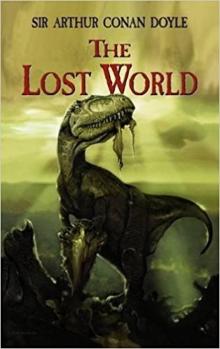 The Lost World
The Lost World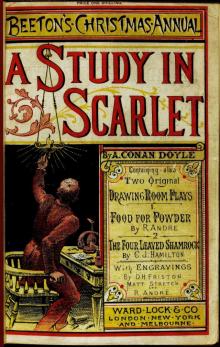 A Study in Scarlet
A Study in Scarlet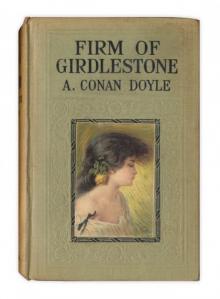 The Firm of Girdlestone
The Firm of Girdlestone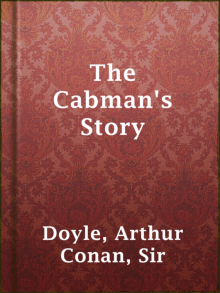 The Cabman's Story
The Cabman's Story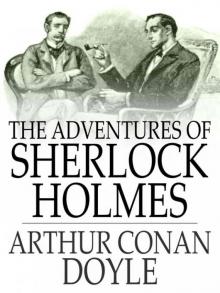 The Adventures of Sherlock Holmes
The Adventures of Sherlock Holmes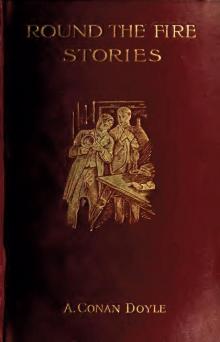 Round the Fire Stories
Round the Fire Stories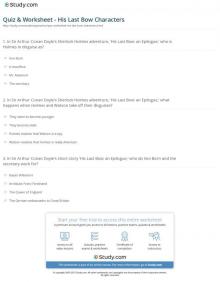 His Last Bow: An Epilogue of Sherlock Holmes
His Last Bow: An Epilogue of Sherlock Holmes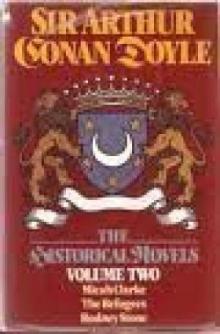 Micah Clarke
Micah Clarke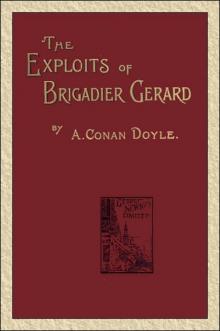 The Exploits of Brigadier Gerard
The Exploits of Brigadier Gerard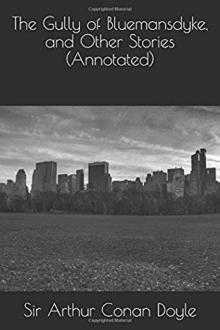 The Gully of Bluemansdyke, and Other stories
The Gully of Bluemansdyke, and Other stories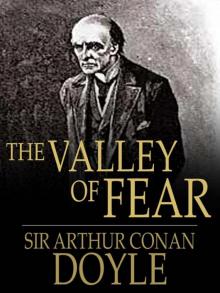 The Valley of Fear
The Valley of Fear The Last of the Legions and Other Tales of Long Ago
The Last of the Legions and Other Tales of Long Ago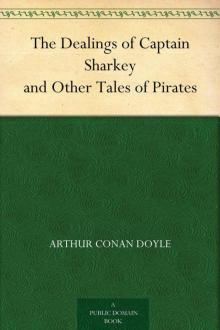 The Dealings of Captain Sharkey, and Other Tales of Pirates
The Dealings of Captain Sharkey, and Other Tales of Pirates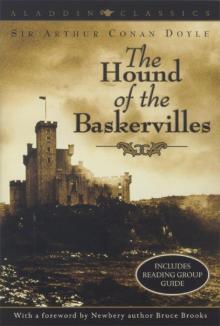 The Hound of the Baskervilles
The Hound of the Baskervilles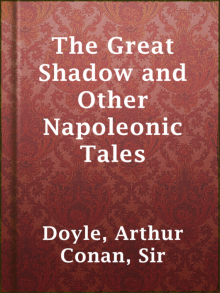 The Great Shadow and Other Napoleonic Tales
The Great Shadow and Other Napoleonic Tales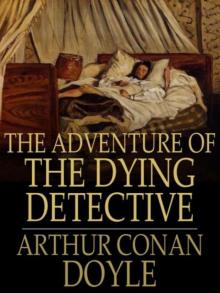 The Adventure of the Dying Detective
The Adventure of the Dying Detective The Man from Archangel, and Other Tales of Adventure
The Man from Archangel, and Other Tales of Adventure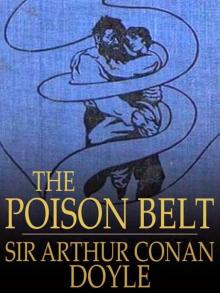 The Poison Belt
The Poison Belt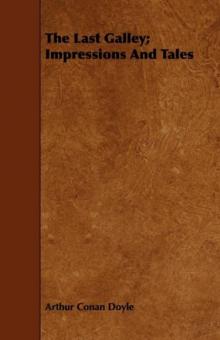 The Last Galley; Impressions and Tales
The Last Galley; Impressions and Tales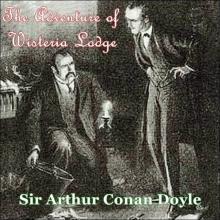 The Adventure of Wisteria Lodge
The Adventure of Wisteria Lodge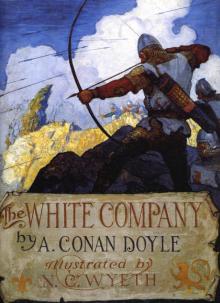 The White Company
The White Company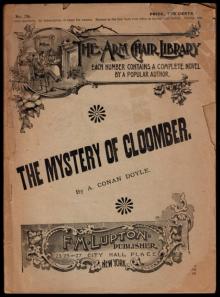 The Mystery of Cloomber
The Mystery of Cloomber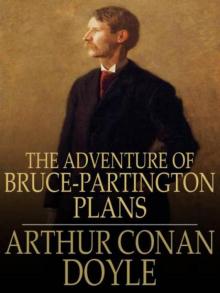 The Adventure of the Bruce-Partington Plans
The Adventure of the Bruce-Partington Plans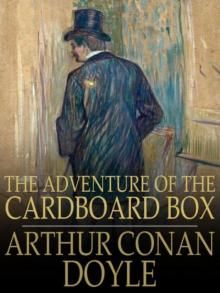 The Adventure of the Cardboard Box
The Adventure of the Cardboard Box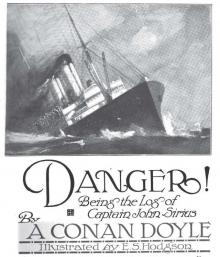 Danger! and Other Stories
Danger! and Other Stories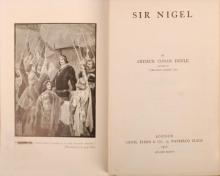 Sir Nigel
Sir Nigel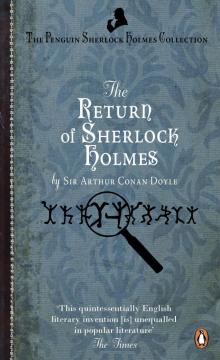 The Return of Sherlock Holmes
The Return of Sherlock Holmes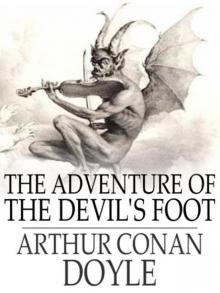 The Adventure of the Devil's Foot
The Adventure of the Devil's Foot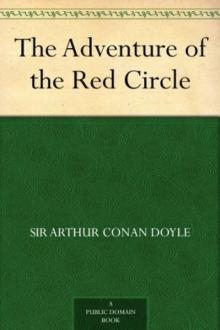 The Adventure of the Red Circle
The Adventure of the Red Circle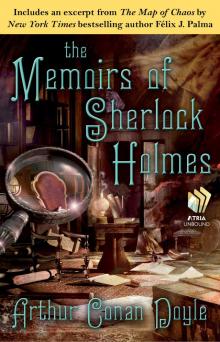 The Memoirs of Sherlock Holmes
The Memoirs of Sherlock Holmes The Adventure of the Yellow Face
The Adventure of the Yellow Face The Adventure of the Norwood Builder
The Adventure of the Norwood Builder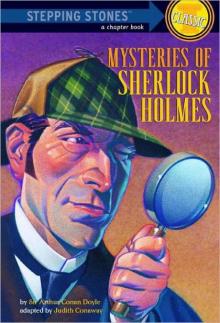 Mysteries of Sherlock Holmes
Mysteries of Sherlock Holmes The Adventure of the Missing Three-Quarter
The Adventure of the Missing Three-Quarter The Adventure of the Final Problem
The Adventure of the Final Problem A Scandal in Bohemia
A Scandal in Bohemia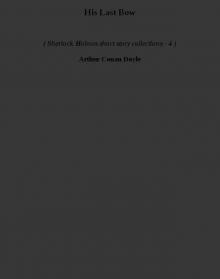 His Last Bow shssc-4
His Last Bow shssc-4 Beyond The City
Beyond The City The Adventure of the Gloria Scott
The Adventure of the Gloria Scott The Parasite
The Parasite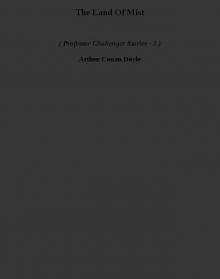 The Land Of Mist pcs-3
The Land Of Mist pcs-3 The Adventure of the Musgrave Ritual
The Adventure of the Musgrave Ritual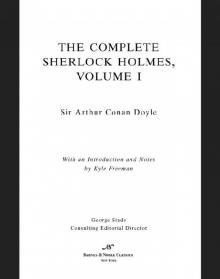 The Complete Sherlock Holmes, Volume I (Barnes & Noble Classics Series)
The Complete Sherlock Holmes, Volume I (Barnes & Noble Classics Series) The Adventure of the Stockbroker's Clerk
The Adventure of the Stockbroker's Clerk The Adventure of the Copper Beeches
The Adventure of the Copper Beeches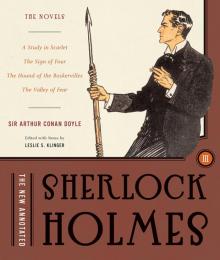 The New Annotated Sherlock Holmes
The New Annotated Sherlock Holmes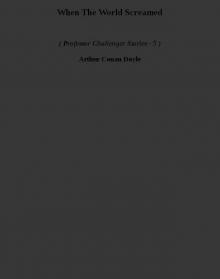 When The World Screamed pcs-5
When The World Screamed pcs-5 The Adventure of the Six Napoleons
The Adventure of the Six Napoleons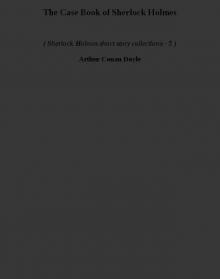 The Case Book of Sherlock Holmes shssc-5
The Case Book of Sherlock Holmes shssc-5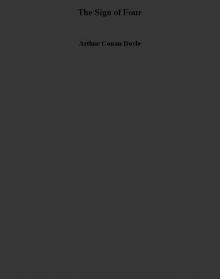 The Sign of Four
The Sign of Four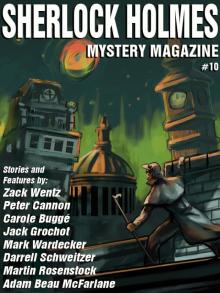 Sherlock Holmes Mystery Magazine #10
Sherlock Holmes Mystery Magazine #10 The Adventures of Brigadier Gerard
The Adventures of Brigadier Gerard The Adventure of the Second Stain
The Adventure of the Second Stain The Adventure of the Engineer's Thumb
The Adventure of the Engineer's Thumb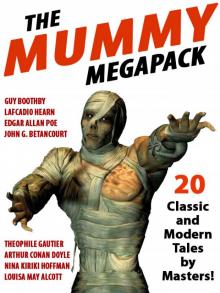 The Mummy Megapack
The Mummy Megapack The Disintegration Machine pcs-4
The Disintegration Machine pcs-4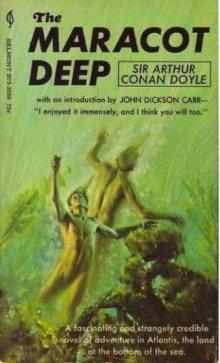 The Maracot Deep
The Maracot Deep The Five Orange Pips
The Five Orange Pips The Adventure of the Crooked Man
The Adventure of the Crooked Man The Adventure of the Blue Carbuncle
The Adventure of the Blue Carbuncle The Adventure of Silver Blaze
The Adventure of Silver Blaze The Adventure of the Solitary Cyclist
The Adventure of the Solitary Cyclist The Adventure of the Naval Treaty
The Adventure of the Naval Treaty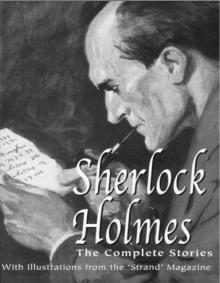 Sherlock Holmes. The Complete Stories
Sherlock Holmes. The Complete Stories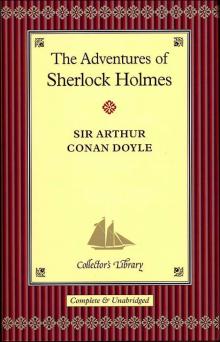 The Adventures of Sherlock Holmes (sherlock holmes)
The Adventures of Sherlock Holmes (sherlock holmes) The Adventure of the Empty House
The Adventure of the Empty House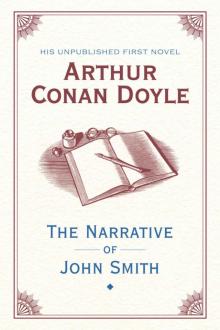 The Narrative of John Smith
The Narrative of John Smith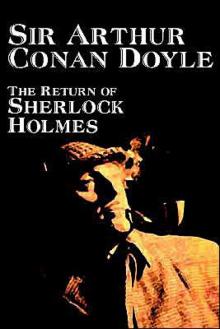 The Return of Sherlock Holmes (sherlock holmes)
The Return of Sherlock Holmes (sherlock holmes) The New Revelation
The New Revelation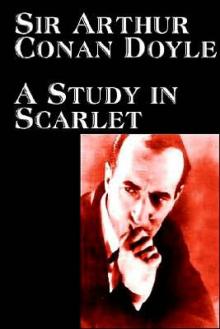 A Study in Scarlet (sherlock holmes)
A Study in Scarlet (sherlock holmes) The Vital Message
The Vital Message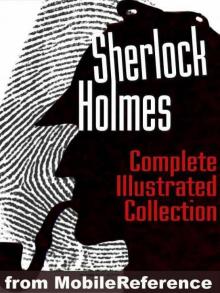 Sherlock Holmes Complete Collection
Sherlock Holmes Complete Collection Round the Red Lamp
Round the Red Lamp The Boscombe Valley Mystery
The Boscombe Valley Mystery The Adventure of the Beryl Coronet
The Adventure of the Beryl Coronet The Refugees
The Refugees The Adventure of the Three Students.
The Adventure of the Three Students.